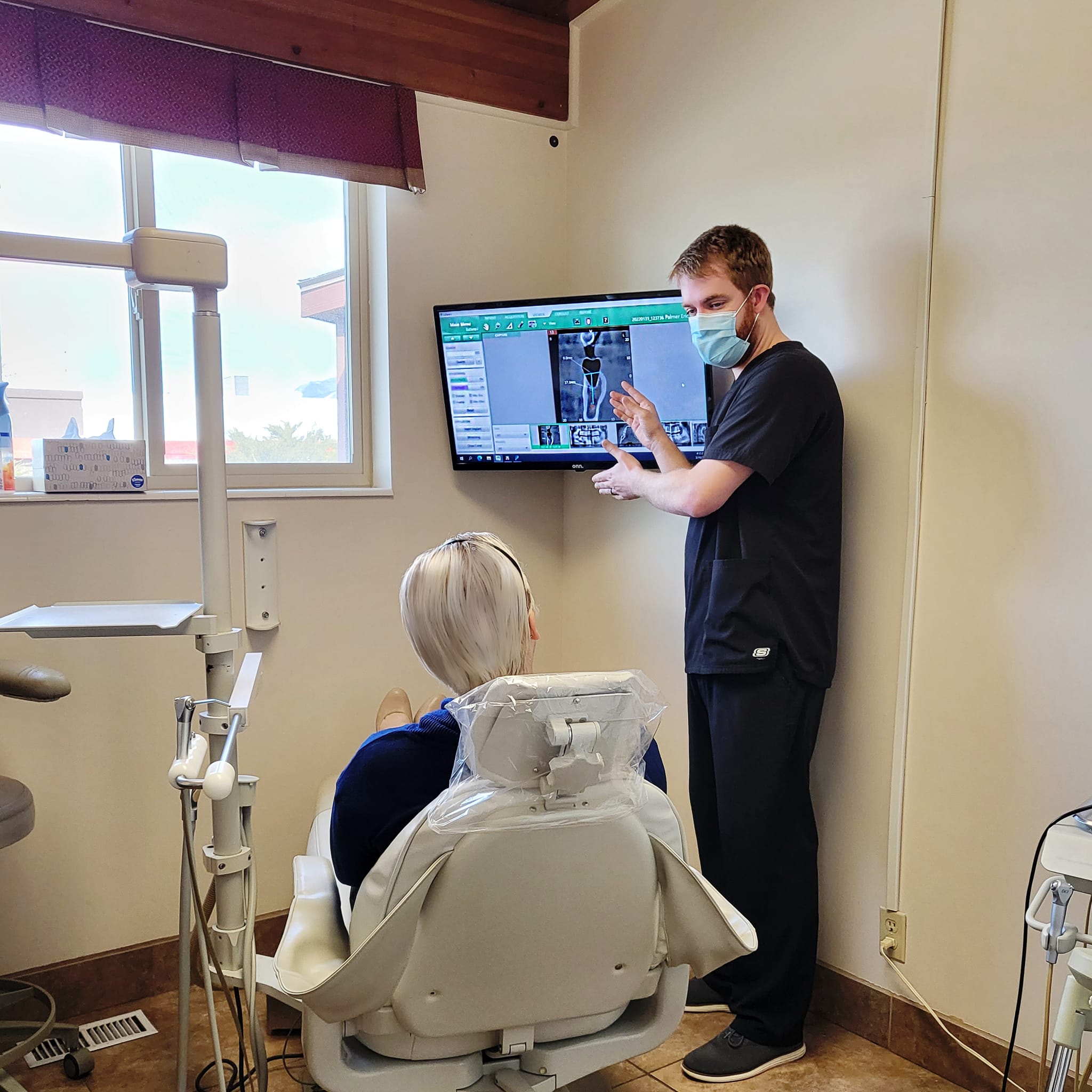Dental crowns can effectively fix a chipped tooth by covering and protecting the damaged area, restoring its appearance and function. Custom-made to fit over the existing tooth, crowns provide a durable and natural-looking solution, especially for larger chips where a filling or bonding might not suffice. The process involves preparing the tooth, taking impressions, and fitting a temporary crown while the permanent one is fabricated.
When you chip a tooth, it’s important to see a dentist promptly. This is because a dentist is best equipped to assess the severity of the chip and recommend the most suitable treatment, be it a crown or another restoration. Timely intervention is crucial to achieving the best outcome and maintaining overall dental health. If you’re experiencing pain, swelling, or difficulty eating, don’t hesitate to seek dental care immediately.
How effective are dental crowns for repairing chipped teeth?
Dental crowns are highly effective for repairing chipped teeth, offering several key benefits:
- Durability and Strength: Crowns are made from strong materials like porcelain, ceramic, metal, or composite resins, which provide excellent durability. They can withstand the forces of biting and chewing, making them ideal for repairing significant chips or fractures.
- Restoration of Function: By covering the entire tooth, a crown restores its shape, size, and function. This allows for normal biting and chewing, which a chipped tooth might compromise.
- Protection: Crowns provide a protective barrier for the damaged tooth, preventing further chipping, cracking, or decay. This is particularly important for teeth that have experienced substantial damage or have undergone root canal therapy.
- Aesthetic Improvement: Crowns are custom-made to match the color, shape, and size of your natural teeth, providing a seamless and natural appearance. This is especially beneficial for front teeth, where aesthetics are a significant concern.
- Longevity: With proper care, dental crowns can last many years, often 10 to 15 years or longer. This long-term solution helps maintain dental health and reduces the need for more frequent dental repairs.
- Comfort: Once in place, crowns function like natural teeth, providing comfort and confidence in eating and speaking.
Overall, dental crowns are an effective and reliable solution for repairing chipped teeth, offering functional and aesthetic benefits while ensuring long-term protection and durability.
What steps are involved in getting a dental crown for a chipped tooth?
Getting a dental crown for a chipped tooth involves several steps, typically spread over two visits to the dentist:
- Initial Examination and Consultation
- The dentist examines the chipped tooth and takes X-rays to evaluate damage and tooth and gum health.
- If the tooth has severe root canal treatment may be needed for deterioration or infection necessary before placing the crown.
- Tooth Preparation
- Dentists numb teeth and surrounding areas with a local anesthetic.
- The chipped tooth is reshaped to accommodate the crown, which involves removing a portion of the tooth structure to make space for the crown.
- If a large portion of the tooth is missing, the dentist may use filling material to strengthen the tooth structure and ensure the crown fits properly.
- Impression Taking
- After preparing the tooth, the dentist takes an impression of the reshaped tooth and the surrounding teeth.
- This impression is delivered to a dental facility for custom crown fabrication. This crown matches your natural teeth’ color, shape, and size.
- Temporary Crown Placement
- While waiting for the permanent crown, for protection, the dentist installs a temporary crown on the prepared tooth.
- The temporary crown is usually made of acrylic or stainless steel and is less durable than the permanent one.
- Permanent Crown Placement
- Once the permanent crown is ready (usually in 1-2 weeks), the patient returns to the dentist.
- The dentist removes the temporary crown and evaluates the permanent crown’s fit and color.
- If everything is satisfactory, the dentist numbs the tooth again and permanently cements the crown.
- Final Adjustments and Polishing
- The dentist makes any necessary adjustments to ensure the crown fits comfortably and the bite is correct.
- The crown is then polished to blend seamlessly with the surrounding teeth.
- Aftercare and Follow-Up
- The dentist provides instructions on how to care for the new crown, including proper brushing and flossing techniques.
- Regular dental checkups help maintain the crown and to monitor overall dental health.
Following these steps, the dental crown procedure effectively restores the chipped tooth’s function and appearance, providing a long-lasting solution.
How soon should you visit a dentist after chipping a tooth?
Visiting a dentist as soon as possible after chipping a tooth is important. Here are the reasons why prompt attention is necessary:
- Prevent Further Damage: A chipped tooth is more susceptible to further chipping, cracking, or breaking. Immediate dental attention can help prevent additional damage.
- Avoid Infection: Chipped teeth can expose the tooth’s inner layers, increasing the risk of infection or decay. Quick treatment can protect the tooth from bacteria and prevent significant dental complications.
- Manage Pain and Sensitivity: Chipping a tooth can lead to pain and increased sensitivity, especially if the damage affects the tooth’s nerve. A dentist can provide treatments to alleviate discomfort and protect the tooth.
- Restore Function: Timely dental care ensures the tooth’s function is restored quickly, allowing you to eat and speak comfortably without risking further injury.
- Aesthetic Concerns: A chipped tooth, especially in the front of the mouth, can affect your smile and confidence. A dentist can provide solutions to restore the appearance of your tooth promptly.
- Customized Treatment Plan: Early intervention allows the dentist to assess the damage and choose the best treatment, such as softening the chip, bonding, or crowning.
Visiting a dentist as soon as possible after chipping a tooth is crucial for preventing further damage, managing pain, and ensuring the best possible outcome for your dental health and appearance.
Are there any risks associated with delaying treatment for a chipped tooth?
Yes, several risks are associated with delaying treatment for a chipped tooth. Here are the primary concerns:
- Further Damage: A chipped tooth is weaker and more susceptible to additional cracking or breaking. Normal activities such as eating or speaking can exacerbate the damage without prompt treatment.
- Infection and Decay: Chipped teeth expose the dentin or pulp, making them susceptible to bacterial infection. Cavities, abscesses, and root canals or extractions can result.
- Increased Sensitivity and Pain: Exposed dentin or pulp can increase heat, cold, and sweet sensitivity foods and beverages, leading to discomfort or pain that can worsen without treatment.
- Alignment Issues: If a significant portion of the tooth is chipped, it can affect the alignment of your bite. Misalignment can cause uneven wear teeth, jaw pain, and issues with chewing and speaking.
- Gum Irritation: Sharp edges from a chipped tooth can irritate or cut the surrounding gums and soft tissues, leading to discomfort and potential infection in the gum tissue.
- Aesthetic Concerns: Delaying treatment can impact the appearance of your smile, especially if the chipped tooth is visible when you talk or smile. This can affect your self-confidence and social interactions.
- Complications with Treatment: The longer you wait to seek treatment, the more complex and costly the necessary dental procedures might become. Early intervention often allows for simpler and more conservative treatments.
- Potential for Tooth Loss: In severe cases, untreated chips can lead to significant structural damage, increasing the risk of tooth loss. This could necessitate more extensive dental work, such as implants or bridges, to replace the lost tooth.
Delaying treatment for a chipped tooth can lead to complications, from increased pain and infection to more complex and costly dental procedures. It’s important to see a dentist promptly to help minimize these hazards and optimize tooth health.
Fix Chipped Teeth: Visit a Dentist Today!
At Gentle Touch Family Dentistry, our experienced team is here to provide prompt and effective treatment for chipped teeth, including custom dental crowns that restore function and appearance. Delaying therapy can worsen damage sensitivity, and potential infection. We ensure the best possible outcome for your dental health and smile by addressing the issue early.
Trust our compassionate and skilled professionals to deliver care in a comfortable and welcoming environment. Contact Gentle Touch Family Dentistry today to schedule your appointment and get your smile back on track!



